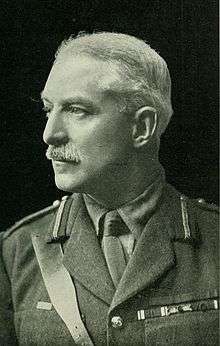George K. Cockerill

Brigadier General Sir George Kynaston Cockerill. CB (13 August 1867 – 19 April 1957)[1] was a British Army officer and a Conservative Party politician.
Cockerill was the son of the Surgeon-General Robert William Cockerill, and his wife Clara Sandys, daughter of Major-General Charles Pooley.[2]
He joined the Queen's Royal Regiment (West Surrey) in 1888, was promoted to a lieutenant on 26 June 1889, and served in the Hazara Expedition in 1891.[2] From 1892 to 1895 he explored the eastern Hindu Kush, for which he won the MacGregor Memorial medal and was a gold medallist of the Royal United Services Institute in India. He served with the Chitral Relief Force in 1895, on the North-West Frontier of India from 1897 to 1898, and was promoted to captain on 11 February 1899. He was a staff officer in the Second Boer War from 1900 to 1902, serving as deputy assistant adjutant general for communications from February 1900.[2] For his war service, he was mentioned in despatches (dated 8 April 1902[3]) and received the brevet promotion as major in the South African Honours list published on 26 June 1902.[4] In 1907 he became a major in the Royal Fusiliers (City of London Regiment), and retired from that post in 1910.[2]
At the December 1910 general election he stood unsuccessfully as the Conservative candidate in the Thornbury division of Gloucestershire.[5] He was British technical delegate at the Hague Conference in 1907.[2] During World War I he served in the War Office, first as Sub-Director of Military Operations, then as Deputy Director of Military Intelligence and Director of Special Intelligence with the rank of Brigadier-General.[2] He received many honours for his wartime work, including being made a Companion of the Order of the Bath (military division) in 1916.[2]
At the 1918 general election he was elected unopposed[6] as the Member of Parliament (MP) for the Reigate division of Surrey, having stood as a Coalition Conservative. He was returned unopposed in 1922 and in 1923, and re-elected with large majorities in 1924 and 1929.[6] He retired from the House of Commons at the 1931 general election,[6] having been knighted in the King's Birthday Honours in 1926.[7]
Publications
- Sir George Cockerill. “Pioneer Exploration in Hunza and Chitral.” The Himalayan Journal. Vol. 11. 1939. 14-41.
References
- ↑ Leigh Rayment's Historical List of MPs – Constituencies beginning with "R" (part 1)
- 1 2 3 4 5 6 7 Hesilridge, Arthur G. M. (1922). Debrett's House of Commons and the Judicial Bench 1922. London: Dean & Son. p. 35.
- ↑ The London Gazette: no. 27443. pp. 3967–3974. 17 June 1902.
- ↑ The London Gazette: (Supplement) no. 27448. pp. 4191–4194. 26 June 1902.
- ↑ Craig, F. W. S. (1989) [1974]. British parliamentary election results 1885–1918 (2nd ed.). Chichester: Parliamentary Research Services. p. 287. ISBN 0-900178-27-2.
- 1 2 3 Craig, F. W. S. (1983) [1969]. British parliamentary election results 1918–1949 (3rd ed.). Chichester: Parliamentary Research Services. p. 479. ISBN 0-900178-06-X.
- ↑ The London Gazette: no. 33179. p. 4402. 2 July 1926. Retrieved 24 December 2010.
External links
- Hansard 1803–2005: contributions in Parliament by George Cockerill
| Parliament of the United Kingdom | ||
|---|---|---|
| Preceded by Richard Hamilton Rawson |
Member of Parliament for Reigate 1918 – 1931 |
Succeeded by Gordon Touche |